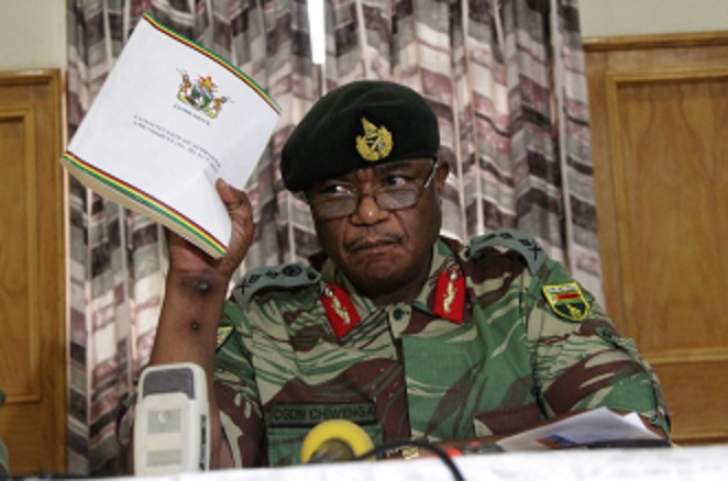Zimbabwe’s Human Rights Problem – A Thread
1/20 Zimbabwe’s human rights problem goes back to days of a violent liberation struggle from 1966 to 1980 when both the Smith regime & the Zimbabwe liberation fighters (ZANLA & ZIPRA) committed serious abuses with total impunity.
1/20 Zimbabwe’s human rights problem goes back to days of a violent liberation struggle from 1966 to 1980 when both the Smith regime & the Zimbabwe liberation fighters (ZANLA & ZIPRA) committed serious abuses with total impunity.
2/20 During the 14-year war for black majority rule, any dissent or criticism of those in charge, often triggered the label sellout & was punishable by death, sometimes after kangaroo court processes either by the Smith regime or by the guerilla fighters.
3/20 At independence in 1980, there was a blanket amnesty of atrocities on both sides, & and an integration of the Rhodesian army & ZANLA & ZIPRA to form one Zimbabwe National Army.
4/20 The modus operandi of the Zimbabwe Gvt under Mugabe as executive Prime Minister (1980 to 1987), was to use violent military force to settle political questions of the day, including the crushing of the opposition ZAPU through the Gukurahundi massacres.
5/20 The Gukurahundi massacres targeting the Ndebele people in the Midlands & Matabeleland provinces killing an estimated 20,000 people, with total impunity as the soldiers involved, the North-Korean trained 5th Brigade, were never prosecuted for the abuses committed.
6/20 In April 1988, the government issued Clemency Order (1) which provided amnesty to state security forces & the so-called dissidents implicated in human rights abuses between 1982 & the end of 1987 in the Midlands and Matabeleland provinces.
7/20 Just like during the war when the freedom fighters were everything (the police, prosecution, & judges), in post-independence Zimbabwe, the military through ZANU-PF controls key state institutions like the police, the prosecution, & the judiciary.
8/20 The near total partisan control of all key state institutions by ZANU-PF is summarized in President Mnangagwa’s boast that as ZANU-PF, “We are police, we are the judiciary, we are the army. We are everything!”
9/20 When ZANU-PF & its allies commit human rights abuses, often the partisan police look the other way, or, if they get arrested, the partisan judiciary & prosecution ensures they are not held accountable, & a partisan state media pretends there are no abuses.
10/20 At crucial political moments like elections, security forces intervene, use political violence & intimidation to ensure their desired electoral outcome, or the partisan, captured & militarized Zimbabwe Electoral Commission ensures the desired electoral outcome.
11/20 The 2008 state-sponsored violence was a military operation dubbed “Operation Makavhotera papi? – Who Did You Vote for?” organized & executed by the military, killing over 200 opposition MDC supporters with near total impunity.
12/20 The 2008 political violence was orchestrated by the Joint Operations Command, which is headed by senior ZANU-PF officials & includes the heads of the Zimbabwe Defence Forces, police, prison services, & the Central Intelligence Organization.
13/20 The 2008 human rights abuses in Marange diamond fields that left over 200 people dead, was a military operation dubbed, “Operation Hakudzokwi – You Will Not Return!”
14/20 When the military ousted Mugabe in November 2017, it was a military figure, Rt Brigadier General Judge George Chiweshe, who delivered a Court ruling that the military intervention was lawful, justifying military interference in civilian & political affairs.
15/20 More recently under Mnangagwa, during protests in August 2018 & January 2019, it was the military the used live ammunition on protestors killing 6 people in August 2018 & 17 people in January 2019, with not a single arrest or prosecution of those responsible.
16/20 The same modus operandi relates to corruption, where those with ZANU-PF links loot with police often looking the other way, or, if are arrested, the partisan prosecution & judiciary seeks political direction on how to handle the cases.
17/20 Zimbabwe’s human rights problem is the problem of a highly militarized authoritarian regime that routinely offers the people to vote in choiceless elections & has a Constitution with a Bill of Rights which citizens are unable to enjoy in real life.
18/20 Zimbabwe’s human rights problem stems from a highly militarized post-colonial Gvt backed by a highly politicized & partisan military that uses violence to settle political disputes – like in cases of abductions & torture of government critics by state agents.
19/20 Without security sector reforms, there can be no solution to Zimbabwe’s human rights problem, & there is no possibility of a credible, free & fair poll in 2023.
20/20 Zimbabwe authorities should take all steps necessary to ensure that the military plays a completely neutral role in elections & politics & the issue of accountability for past & recent violations of human rights violations.
. @Wamagaisa @VoaShona @euinzim @MinisterSBMoyo @edmnangagwa @WeArePindula @263Chat @NewZimbabweCom @NewsdayZimbabw3 @ZULUBLE @freemanchari @DrVChimhutu @zimlive @zenzele @MilesTendi @zditrust @PedzisaiRuhanya @NehandaRadio

 Read on Twitter
Read on Twitter


